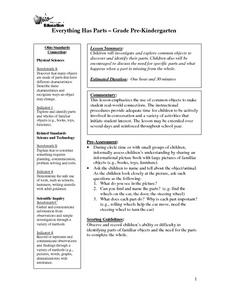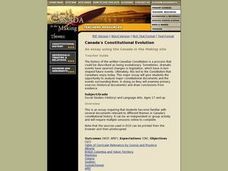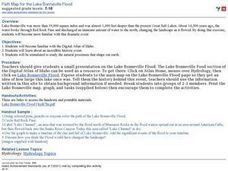Curated OER
Collecting Electromagnetic Radiation
Students using different experiments and activities explore electromagnetic radiation and the effect on the Earth.
Curated OER
Liquid Crystal IR Detector
Middle schoolers experiment with one method of detecting infrared radiation. They simulate the detection of infrared radiation using a liquid crystal sheet.
Curated OER
Something Fishy
Students identify and discuss the adaptive characteristics and behaviors of fish. They view slides of fish, and design and create a model of a fish of the future, listing the ways their fish adapt to survive.
Curated OER
Math & Social Science
Students are given data and are to calculate averages and yearly totals of how many cars travel the Tacoma Narrows Bridge. They also make a graph of the data.
Curated OER
Iowa Agriculturist
Tenth graders review the Iowa Agriculturist, retell the annual and seasonal cycle of farming and describe pioneer farming practices.
Curated OER
Words and Music - Lesson 2
Students analyze the relationships among cultural values, freedom of artistic expression, ethics, and artistic choices in various cultures and historical periods.
Curated OER
Managing the Teaching-Learning Process
Twelfth graders begin to recognize how 2,400 year-old dramas are applicable to their lives after reading OEDIPUS THE KING, AGAMEMNON, ANTIGONE, MEDEA, HIPPOLYTUS, and FROGS.
Curated OER
Triangles Are Not Bad!
Young scholars investigate stereotypes and diversity by performing a play about shapes entitled, "Triangles Are Not Bad!" They role play as the shapes who each feel they are superior to the rest.
Curated OER
The Elephant Ate a Banana in the Tundra
Students perform a scene with their small group. They identify an animal, act out what the animal does, where the animal would be found, and what the animal eats. They locate the animal habitats on a map.
Curated OER
Bacteria Change Earth's Atmosphere
Tenth graders organize information to explain how photosynthetic bacteria contributed to climatic changes that happened on Earth. Students create a timeline by using a storyboard to tell the story of the change.
Curated OER
Everything Has Parts
Students investigate and explore common objects to discover and identify their parts. They also are encouraged to discuss the need for specific parts and what happens when a part is missing from the whole.
Curated OER
Sight Words on a Snowy Evening
Students read various poems by Robert Frost. In groups, they use the text of one poem to identify sight words that are new to them. As a class, they listen to a recording of the poem and then repeating it outloud practicing their...
Curated OER
Creating and Acting Mammal Stories
Fifth graders write and perform stories on mammals. They review the parts of a narrative story and write stories. They rehearse their stories and present them to the class. They make mammal cookies after their peformance.
Curated OER
Surfing to the Planets on the Internet
Seventh graders explore the planets using computers and other forms of electronic technology. They research data on two planets and compare the data. Students make conclusions regarding the size of their planets. They calculate how long...
Curated OER
Canada's Constitutional Evolution
Students research and write an essay relevant to different themes in Canada's Constitutional History.
Curated OER
A Timeline of Canada's Constitutional Evolution
Students research and make a time line illustrating the evolution of the Canadian Constitution.
Curated OER
Subsurface Contamination of Groundwater
Students evaluate the potential problems associated with underground storage tanks. They research the potential hazards from various subsurface pollutants and simulate a superfund site cleanup.
Curated OER
The Inside Current
Eighth graders explore ocean currents and wind patterns. They discover the concept of systems to show how change in one component of a body of water, causes change in other components in that system. Students describe positive and...
Curated OER
A Cloud In The Hand
Pupils investigate the scientific concept of forming clouds. The use simple materials to simulate the formation. This creates a powerful visual for students to make cognitive connections. They make observations and record them in a lab...
Curated OER
Acid Rain Experiments
Students define the term acid rain, and the causes of acid rain. They locate regions where acid rain is most affected, and what can students deduce from maps of geology and soils in New York State. Students answer the questions why are...
Curated OER
Path Map for the Lake Bonneville Flood
Students use a digital atlas of Idaho to explore the effects of the Lake Bonneville Flood. They become familiar with how floods shape our earth and change landscapes. Students graph a a timeline of the rise and fall of Lake Bonneville.
Curated OER
Theatre Lesson Plan
Second graders complete pantomime and improvisational theatre activities. For this theatre lesson, 2nd graders play a 'sound ball' game and recreate sounds as they toss the ball. Students discuss projection for an actor and practice the...
Curated OER
Text Map: The Structure of Shakespearean Drama
Students identify the structure of Shakespearean Drama. In this Shakespearean drama lesson, students identify features common to Shakespearean drama and explain their purpose.
























